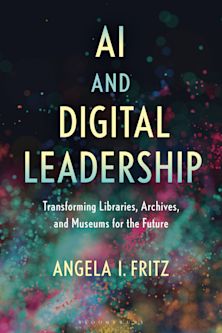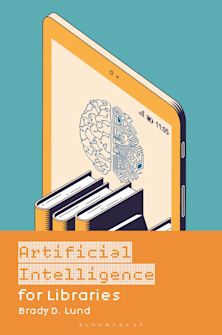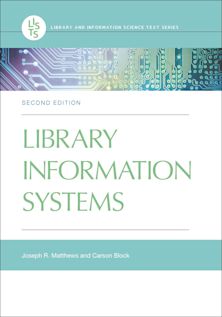- Home
- ACADEMIC
- Library & Information Science
- Information Systems and Technology
- Finding Reliable Information Online
You must sign in to add this item to your wishlist. Please sign in or create an account
Description
We live in an information-saturated environment and spend far too much time searching, surfing, skimming, contributing, and organizing the information in our lives. We spend too little time immersing ourselves in reliable high quality information. We are often so buried in information and strapped for time that we grab information like it was fast food, without bothering to evaluate its quality.
Finding Reliable Information Online: Adventures of an Information Sleuth uses stories or “information adventures” to illustrate the best approaches to searching for information and to help us develop our aptitude for locating high quality resources in a rapidly changing digital environment that is becoming proficient at monopolizing our attention with useless or unreliable information. This book is about taking charge of the search process and not handing over the reins to search engines like Google, Bing, or Yahoo to dictate what information we consume.
Each chapter focuses on a quest for different types of information while digging deeper into the complexities of finding credible places to look for information and ways to think about evaluating it. As the Internet evolves and becomes more sophisticated, our strategies for finding and evaluating information need to evolve as well. The stories in this book range from investigating challenging research questions to exploring health issues and everyday life questions like finding a reliable restaurant or product review. These chapters go beyond the simple and more mechanical checklist approach to evaluating information, though these factors are also discussed.
Table of Contents
Acknowledgments
Introduction
Chapter 1. Drinking: An Information Story. Finding Reliable Health Information
Chapter 2. Five Stars! Four Girls and Free Brunch. Finding Reliable Restaurant Reviews
Chapter 3. The Wisdom of a Crowd of Experts. Finding Reliable Scholarly Research
Chapter 4. Word of Mouse. Finding Reliable Travel Information.
Chapter 5. The Dog Effect. Finding Reliable Popular and Science Information.
Glossary
Instructor Guide
Index
About the Author
Product details
| Published | Sep 16 2015 |
|---|---|
| Format | Ebook (PDF) |
| Edition | 1st |
| Extent | 1 |
| ISBN | 9798216223573 |
| Imprint | Rowman & Littlefield Publishers |
| Publisher | Bloomsbury Publishing |
About the contributors
Reviews
-
Stebbins’ examples and personal anecdotes illustrate the very serious issues facing anyone who uses the Internet as a research tool. The lively and engaging writing makes understandable high-concept topics such as the distinction between slow versus fast thinking as related to the evaluation of information and deep versus shallow web research. Suitable for a general audience as well as information students.
Booklist
-
This is a handy and entertaining guide for anyone trying to understand how to find reliable information online, whether it's through Google (or similar search engines), or by using topic-specific sites and databases. . . .Readers can certainly relate to Stebbins' real life examples, and she brings a lively wit and sense of humor to each search situation. I thoroughly enjoyed this book and highly recommend it.
Journal of Academic Librarianship
-
This book is an excellent basic handbook on how field researchers in various fields (e.g. archaeology, anthropology, geology, biology, etc.) can prepare for the various types of mishaps – and in some cases – disasters, that can occur out in the field, and what to do when these things do actually happen. . . .[To t]hose who are relatively new at doing research out in the field – this is a treasure trove of healthy and sound advice. I would read it – this may help you recover from various screw ups in the field – and even save your life in others.
The Ackerman Family Bar-Ilan University Expedition to Gath
-
Leslie Stebbins’s book is a splendid exploration of the twists and turns that the search for information can take. It’s lively and engaging without sacrificing depth, seriousness of purpose, or professionalism. She uses examples that are relevant and connected to the everyday problems and questions of search while deeply engaging with a wide variety of perspectives and literature on the field, all in an entertaining and thought-provoking way. I think a lot of people are going to find this valuable and fun to read.
Joseph Janes, Associate Professor and Chair, MLIS Program, Information School , University of Washington
-
If you want to improve your own life, the lives of those around you, and the quality of life online, read (the wonderfully readable) Finding Reliable Information Online, give copies away to your friends (as I plan to do), and see if you can get it added to your local high school or college curriculum. Founded on well-researched principles and brought to life through stories we can all relate to, Leslie Stebbins’ book is a valuable contribution, a useful tool, and a sign of hope for the future.
Howard Rheingold, former lecturer at the University of California at Berkeley and Stanford University.and author of NetSmart, The Virtual Community, Smart Mobs and other books
-
Anyone who searches for information on the Internet, which is everyone, should read this book and take its advice to heart. Self-described “information extremist” Leslie Stebbins both uses the checklist approach to evaluating information and goes well beyond it by delving into the psychology of search and the nuances of experts, amateurs, and crowds. Her fun narratives about finding and evaluating scholarly and everyday information read like detective stories, and her many strategies, tips, mnemonics and lessons learned will be invaluable to students, librarians, educators, and researchers everywhere.
Marc Meola, Assistant Professor and Information Literacy Librarian at the Community College of Philadelphia



































